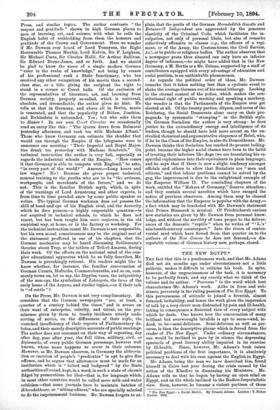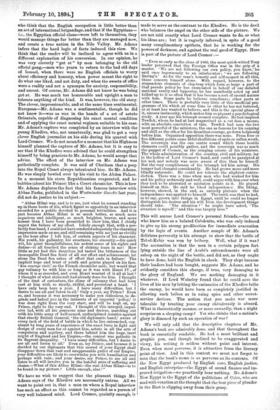THE NEW EGYPT.*
THE fact that this is a posthumous work, and that Mr. Adams died not six months ago under circumstances not a little pathetic, makes it difficult to criticise his book. In spite, however, of the ungraciousness of the task, it is necessary to be perfectly frank, and say exactly what we think of the volume and its author. " Perverse " is the word which best characterises Mr. Adams's work. Alike in form and sub- stance, perversity is the ruling passion of The New Egypt. To this perverseness of attitude is joined a feverish, almost frenzied, irritability, and hence the work gives the impression of talk by a very clever man distracted by pain and ill-health, taking in consequence a distorted view of every subject with which he deals. One knows how the conversation of many brilliant but overwrought invalids is apt to seem—and, in- deed, to be—semi-delirious. Semi-delirious as well as per- verse, is then the descriptive phrase which is forced from the reader of The New Egypt. Under ordinary circumstances, one would be inclined to pass by in silence the depressing spectacle of great literary ability impaired in its exercise by ill-health. Since, however, Mr. Adams's book raises political problems of the first importance, it is absolutely necessary to deal with his case against the English in Egypt.
Mr. Adams, being the man we have described him, found himself in Cairo last year during the crisis caused by the action of the Khedive in dismissing his Ministers. Mr. Adams tells us that he began by having an open mind on Egypt, and on the whole inclined to the Radico-Imperialistic view. Soon, however, he became a violent partisan of those
• The New Egypt: a Social Sketch. By Francis Adams. London P. Fisher Unwin. 1893. who think that the English occupation is little better than an act of international brigandage, and that if the Egyptians- i.e., the Egyptian official class—were left to themselves, they would manage things far better than they are managed now,
and create a true nation in the Nile Valley. Mr. Adams infers that the hard logic of facts induced this view. We think that the reader will be inclined to agree with us in a different explanation of his conversion. In our opinion, he was very cleverly "got at" by men belonging to the old official gang,—men who yearn to return to the bad old days of Ismael, when there were no English officials to worry about efficiency and honesty, when power meant the right to do what one liked, and not duty, and when the sweets of office were a reality and not a synonym for anxiety, responsibility, and unrest. Of course, Mr. Adams did not know he was being got at. He was much too honourable and upright a man to tolerate anything of the kind. It was, however, the old story. The clever, impressionable, and at the same time sentimental, European—Mr. Adams was a sentimentalist, though he did not know it—was as wax in the hands of a set of astute Orientals, capable of diagnosing his exact mental condition and of applying the exact mental regimen suitable to his case. Mr. Adams's capture was completed by an interview with the young Khedive, who, not unnaturally, was glad to get a very clever English journalist on his side during his quarrel with Lord Cromer. We do not mean for a moment that his Highness himself planned the capture of Mr. Adams, but it is easy to see that if the Khedive were advised that he could strengthen himself by being gracious to Mr. Adams, he would accept that advice. The effect of the interview on Mr. Adams was pathetically complete. It was said of Chatham that a peep into the Royal Closet always intoxicated him. So Mr. Adams. He was simply bowled over by his visit to the Abden Palace.
In a moment his stern Republicanism evaporated, and he babbles (about his Prince) like a Court chronicler. This is how Mr. Adams deplores the fact that his famous interview with Abbas Pasha, published in the Westminster Gazette last year,
did not do justice to its subject :—
" Abbas Hilmi was, and is to me, just what he seemed standing up in those boots of his, which figure so appositely in an interview recorded for a public devoted to personal trivialities. And it is just because Abbas Hilmi is so much better, so much more sagacious and intelligent, so much brighter, braver, and more honest than I have been permitted to show him, that I chiefly regret the failure of my effort. Likely enough that, with a per- fectly free hand, I could not have rendered adequately the charming impression made on me, and still remaining with me just as vividly as the hour after I left him, of certain aspects of his character. His youth, his gallantry, his sweetness, his sincerity.—his quick wit, his quiet thoughtfulness, his ardent sense of his rights and duties—it all touched the sense of shining tears in me ! How little as yet had this dauntless lad tasted the bitterness of the inescapable Dead Sea fruit of all our effort and achievement, let alone the Dead Sea ashes of effort that ends in failure ! The implicit hope and trust of youth and genius played on his face. son courage riait,' as the French chronicler said ; but would that gay valiancy be with him so long as it was with Henri IV., of whom it is so recorded, and even Henri wearied of it all at last ? I thought of what statecraft had already done for him. I thought of the dust of caricature, the slime of calumny that had been cast at him with so steady, skilful, and persistent a hand. I have only been here a year. I have many difficulties, but I desire to see all and listen to all.' Only a year, my Prince P Even so, and because it was necessary to make you ridiculous, to de- grade and befoul you in the interests of an imperial policy,' it was done right from the very start, and will be kept on, my Prince, right to the very end. I thought of this intrepid, impul- sive lad, with all his generous aims and desires, marching out with his little army of half-armed, undisciplined Asiatics against that sturdy British General, the old diplomatic hand,' aware of every inch of the field of battle in which he lies entrenched, cog- nisant by long years of experience of the exact force in fight and design of every man for or against him, astute in all the arts of compulsion and cajolery, and there behind him the huge, inert might of England and her Empire,—the contest was pathetic in its flagrant inequality. I have many difficulties, but I desire to see all and listen to all.' Even so, my Prince, and because it is decided by our diplomats that this morsel of your Egypt shall disappear down that vast and unappeasable gullet of our Empire, your difficulties are likely to overwhelm you with humiliation and perhaps with ruin ; and your desire, my Prince, to see all and listen to all will involve you in the hateful mire of suffering and shame.—What of this Abbas Hilmi—the real Abbas Hilmi—is to be found in my picture ? Little enough, alas ! "
We have no wish to suggest that the pleasant things Mr. Adams says of the Khedive are necessarily untrue. All we want to point out is, that a man on whom a Royal interview has such an effect as this cannot be regarded as a person of very well balanced mind. Lord Cromer, quaintly enough, is
made to serve as the contrast to the Khedive. He is the devil who balances the angel on the other side of the picture. We are not told exactly what Lord Cromer wants to do, or what his ideas are ; but it is vaguely inferred, in spite of a good many complimentary epithets, that he is working for the powers of darkness, and against the real good of Egypt. Here is part of the picture of Lord Cromer :—
"Even as early as the close of 1886, the most quick-witted Tory leader perceived that the Foreign Office was in the grip of a master. 'We are not following our own policy, you know,' he said once ingenuously to an interlocutor ; we are following Baring's. As for the man's honesty and self-respect in all this, these concern himself alone. With regard, however, to the stupendous elements of clap-trap which form so large a part of that pseudo policy he has enunciated in behalf of our deluded national vanity and hypocrisy, he has manifestly acted up and talked up to it so often that it has become a sort of second nature with him. Some parts he believes sometimes ; other parts at other times. There is probably very little of this unofficial pro- gramme of his which at some time or other he has not believed, or at least has wanted to believe, and this is the special phase of it, sincere insincerity, which makes him so piquant a psychological study. A. year ago his triumph seemed complete. He had inspired Tewfick, whom he had at last magnetised as a cat does a mouse, with an absolute conviction of this. Tewfick had seen the two most powerful of the ministers, the one as famous for his cunning and skill as the This will amuse Lord Cromer's personal friends,—the men who know him as a belated Cobdenite, who was only induced to give up his strong predilection for immediate evacuation by the logic of events. Another sample of Mr. Adams's delirious perversity is his attempt to show that the battle of Tel-el-Kebir was won by bribery. Well, what if it was ? The accusation is that the men in a certain polygon fort lying outside the line of Arabi's entrenchments were all asleep on the night of the battle, and did not, as they ought to have done, hold the English in check. They slept because their leaders had been bought, suggests Mr. Adams, and he evidently considers this charge, if true, very damaging to the glory of England. We see nothing damaging in it whatever. If Lord Wolseley found that he could save the lives of his men by letting the emissaries of the Khedive bribe the enemy, he would have been as completely justified in allowing such bribes as in using spies and other secret- service devices. The notion that you make war more tolerable by treating your enemy chivalrously is absurd. What is theoretically meaner, or more cowardly, than a night surprise on a sleeping camp ? Yet who thinks that a nation's glory is dimmed by such an operation of war? We will only add that the descriptive chapters of Mr. Adams's book are admirably done, and that throughout the book is essentially readable. He had a most brilliant and graphic pen, and though inclined to be exaggerated and vi,-wy, his writing is seldom without point and interest. Even when most perverse, it is attractive from the literary point of view. And in this context we must not forget to note that the book's name is as perverse as its contents. Of the New Egypt produced by English care, English justice, and English enterprise—the Egypt of sound finance and im- proved irrigation—we practically hear nothing. Mr. Adams's New Egypt is the Egypt of the politicians of Cairo, who are mad with vexation at the thought that the best piece of plunder in the East is slipping away from their grasp.







































 Previous page
Previous page